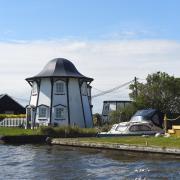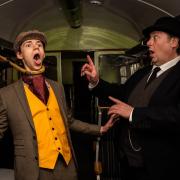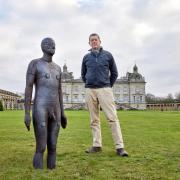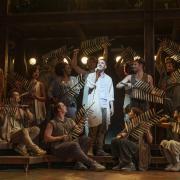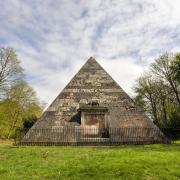Elizabethan England has long allured Norfolk-based writer Rory Clements and now he has written a highly-rated novel set in the era.
Intrigue and inspiration
Elizabethan England has long allured Norfolk-based writer Rory Clements and now he has written a highly-rated novel set in the era. He told Keiron Pim why he’s fascinated by an era in which grisly murder and artistic achievement went hand-in-hand.
Pictures: Denise Bradley
The late 16th century was a particularly unpleasant time to be a Roman Catholic in England. A rap on the door could be the precursor to torture and horrific execution: little wonder many Catholics had secure hiding places installed in their homes, such as the well known priest’s hole at Norfolk’s Oxburgh Hall. Priest-catchers like Richard Topcliffe rampaged around the country, fired by religious righteousness, rooting out “traitors” whose ultimate loyalty lay with the Pope ahead of the Queen, ever-aware that the Spanish Armada had designs on invading and forcibly converting Protestant England back to Catholicism.
Rory Clements evokes this atmosphere of dread and intolerance in his debut novel Martyr, the first in a series of Elizabethan thrillers featuring his hero John Shakespeare, a fictitious brother of William; well, probably fictitious.“Quite early on I had the idea that there had been this brother of William Shakespeare,” says Rory. “We know he had two younger brothers and a couple of sisters but there was another called Jone, and that was what made me think.”Jone Shakspere, as the register at Stratford-upon-Avon’s Holy Trinity Church has it, could have been a Joan or could have been a John – we just don’t know, especially given that, as Rory points out, “Shakespeare never spelled his name the same way and he didn’t spell it how we spell it nowadays”.
Other characters that populate the book certainly existed. John Shakespeare is Lord Walsingham’s chief intelligencer; Father Robert Southwell was a Norfolk-born poet and Jesuit priest “who was beatified 400 years after his body was ripped apart by Elizabeth’s legal system”, and the aforementioned Topcliffe was all too real, a man who brought terror and misery to countless English Catholics. Then there is the Earl of Essex, a favourite of the Queen whom she later had executed for plotting a coup. Everywhere here, treachery and intrigue abound.
For Rory, an ex-Fleet Street journalist who has settled with his family in Ringland, near Norwich, it is this rich array of characters that makes the Elizabethan era irresistible. “I think people love that time. It’s the adventurousness, the courage, the extraordinary contrast between a man like William Shakespeare, who had such humanity, and somebody like Topcliffe, who is a stain on English history. And we have all the other characters of the time that are so huge: Leicester, Walsingham, Essex – they are all incredible characters.
“You think now we have people telling children they shouldn’t climb trees and there was Drake setting off around the world not even having the faintest idea if he would get across the Atlantic.”
Sir Francis Drake is pivotal to the plot of this pacey and very readable page-turner. Tensions are running high in Queen Elizabeth’s court and at any time the axe is due to fall on Mary Queen of Scots’ neck. Her imminent execution has provoked the Spanish to gather their battle fleet, which so far has been kept at bay largely thanks to Drake, England’s “sea dragon”. When a Catholic plot to kill Drake is uncovered, John Shakespeare is ordered to protect him – effectively meaning the country’s fate lies in his hands. Assisting him are a couple of memorable creations: his loyal and rugged assistant Boltfoot Cooper, who sailed around the world with Drake and the wily, debonair go-between Harry Slide. The characters inhabit an unsavoury England full of violence, reeking of sewage; a world where life is often short and brutal and death is ever-present.
The book is the culmination of 15 years’ planning by Rory, whose journalistic career took in spells at the Sunday Mirror, Daily Express and Daily Mail. The research only came to fruition after he moved to Norfolk in 2007. He, his artist wife Naomi and their children George and Madeleine sold up in London and relocated to the county, where Rory’s roots lie; he can trace his ancestry here to Robert Kett. As well as giving Rory the lifestyle he needed to write his novel, leaving the newsrooms of London and moving to Norfolk provided sources of inspiration such as the priest’s hole at Oxburgh Hall, home of the Catholic Bedingfield family: “Imagine being in there when someone like Topcliffe was outside smashing the place up trying to get to you,” he shudders.
Now Rory is working on the follow-ups to Martyr. A second novel, titled Revenger, is due next summer and he plans to continue the series for as long as he can, working within the span of William Shakespeare’s lifetime. In John Shakespeare he has a tough but likeable character of sufficient depth and appeal to sustain a good number of books. “In some ways I see him as the other half of William Shakespeare’s psyche,” he says. “He is a harder man, certainly a lot tougher, but he shares his brother’s values. He shares his humanity but has a different way of expressing it.”
Martyr, by Rory Clements, is published by John Murray in hardback, priced �12.99. For more information, see www.roryclements.co.uk
EDP-Jarrold East Anglian Book Awards
East Anglia has a fine history of inspiring great writing – and on October 8 we will be celebrating all those who are upholding this tradition in 2009.The second EDP-Jarrold East Anglian Book Awards, supported by Writers’ Centre Norwich, aim to showcase the best in fiction and non-fiction books with a Norfolk, Suffolk or Fenland theme. The judges have been deluged with entries for this year’s awards and the winners will be revealed at an evening ceremony at Jarrold in Norwich, for which tickets are now on sale.
Winners will be announced in six categories: Fiction and Poetry, Places and Nature, Art and Photography, History and Tradition, Biography, Guidebooks and Travel. A single overall winner will be named East Anglian Book of the Year, which brings with it a �250 prize.The event will be hosted by Norfolk-based writer and raconteur Keith Skipper. The ticket price covers a buffet meal and a talk by a guest speaker.
Last year saw Carol Birch’s historical novel Scapegallows named the overall East Anglian Book of the Year, after being selected from the category winners. Published by Virago, Birch’s book tells the hair-raising tale of Margaret Catchpole, an 18th-century Suffolk woman. This year’s winner is a very closely guarded secret but on October 8 all shall be revealed.
Tickets for the ceremony, priced �10, are available from Jarrold by telephoning 01603 660661 or calling in at customer services.



